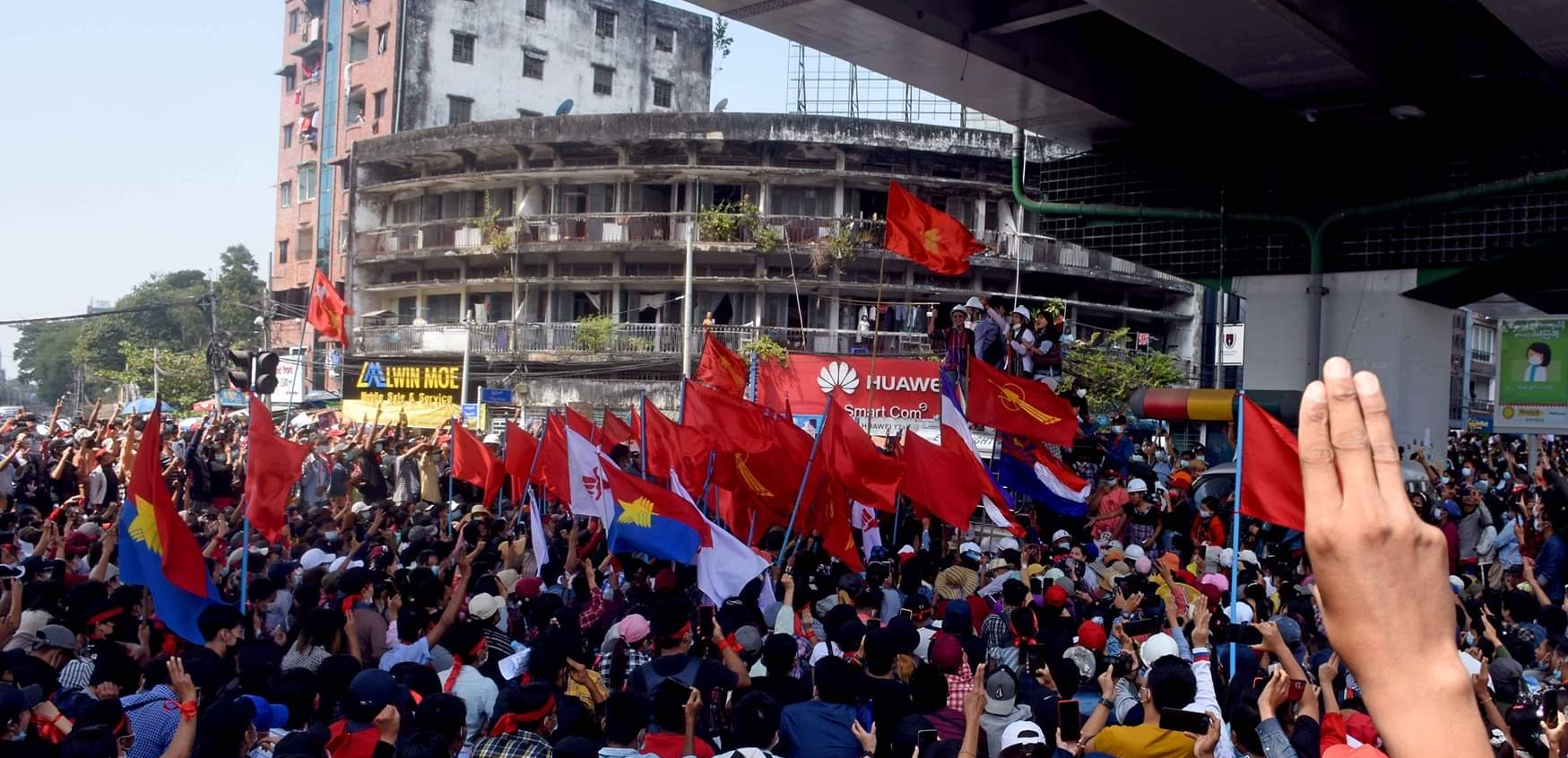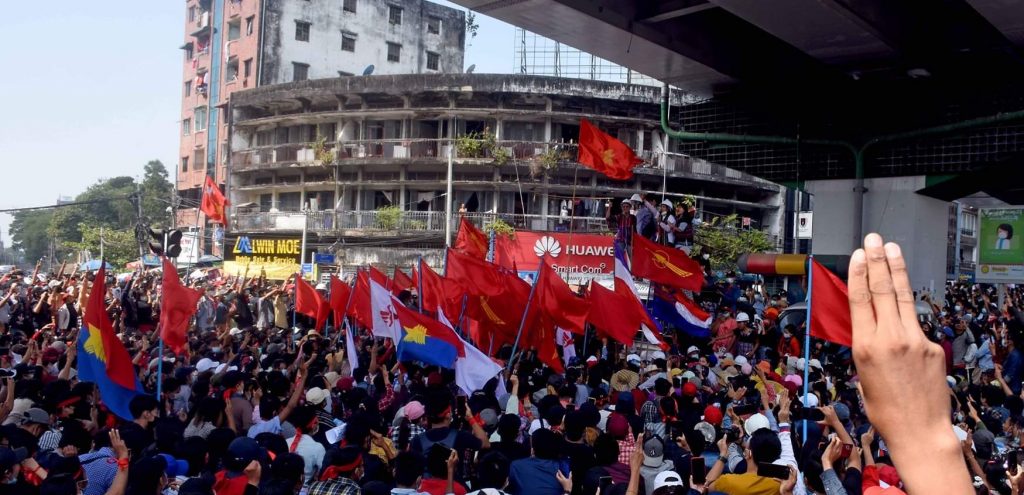Thousands of protesters took to the streets of Burma’s cities in anti-coup demonstrations over the weekend (14 February 2021), after a fearful night that saw residents form patrols and the army roll back laws protecting freedoms.
The military rulers have shut down the country’s internet as thousands of people joined the largest protests yet against the coup.
A near-total internet blackout is in effect with connectivity falling to 16% of ordinary levels, according to the monitoring group NetBlocks Internet Observatory. To get around this, users are using VPNs (virtual private networks) in order to access the internet.
Engineering students marched through downtown Yangon, the biggest city, wearing white and carrying placards demanding the release of former leader Aung San Suu Kyi, who has been in detention since the military overthrew her elected government on 1 February.
A convoy on motorbikes and cars drove through the capital, Naypyidaw. In the south-eastern coastal town of Dawei, a band played drums in shadows cast by awnings as crowds marched under the hot sun. In Waimaw, in the far northern Kachin state on the banks of the Irrawaddy River, crowds carried flags and sang revolutionary songs.
Many protesters across the country were holding up images of Aung San Suu Kyi’s face. Her detention, on charges of importing walkie-talkies, is due to expire on Monday. Her lawyer, Khin Maung Zaw, could not be reached for comment on what was set to happen.
More than 384 people have been detained since the coup, the monitoring group Assistance Association for Political Prisoners said, in a wave of mostly night-time arrests.
“While the international community is condemning the coup, Min Aung Hlaing is using every tool he has to instigate fears and instabilities,” activist Wai Hnin Pwint Thon from the UK-based rights group Burma Campaign UK said on Twitter, referring to the army chief. Many protesters in Yangon carried signs calling to authorities to “stop kidnapping people at night”.
Residents banded together late on Saturday to patrol streets in Yangon and the country’s second-largest city Mandalay, fearing arrest raids as well as common crime after the junta ordered the release of thousands of prisoners.
Worries about criminal activity have soared since Friday, when the junta announced it would free 23,000 prisoners, saying the move was consistent with “establishing a new democratic state with peace, development and discipline” and would “please the public”.
Unverified pictures on social media have fuelled rumours that criminals are trying to stir unrest by setting fires or poisoning water supplies.
Tin Myint, a resident of Sanchaung township in Yangon, was among the crowds who detained a group of four people suspected of carrying out an attack in the neighbourhood. “We think the military intends to cause violence with these criminals by infiltrating them into peaceful protests,” he said.
Three people in different parts of Yangon said they had seen drones hovering above the crowds. “It was flying up and down and filming the crowd chasing after thieves,” said 30-year-old Htet, who asked to be identified by only one name.
An eyewitness who didn’t wish to be name has given the following statement about the situation to Challenge:
“The street protests have been changing in nature constantly since they began properly about a week into the coup. Initially they saw large numbers of people massing in downtown Yangon, but they rapidly changed to become more mobile. There is a long history of mass confrontations with the police and military ending in dead protesters, so the idea is to avoid a repeat of this. The tactics are essentially twofold: firstly, very public street protest complete with fancy dress and meme-heavy signs, to capture international attention. Some people are asking for foreign intervention from the US or the UN, others just want to make sure the world is watching so that it’s more awkward for the military to react violently. Secondly, a civil disobedience movement of strikes, started by healthcare workers and spreading across the public sector and elements of the private sector. The military has massive economic interests in multiple areas, so boycotts of military products and mass withdrawals from military owned banks are part of this.
“These protests are taking place in most towns across the country, and the vast majority of people are in support of Aung San Suu Kyi, or at least of democracy. To many people in Myanmar she embodies democracy, correctly or otherwise. I’ve seen people from all walks of life and ages on the streets; grannies have flashed the three-fingered rebel salute at me in the market, young kids ride on the back of pickups or mopeds festooned with red NLD flags and banners. Mass marches of particular occupations, such as Yangon’s city council workers, have been common. In some cases they’re unionised but often it’s organised through informal networks. In class terms the primary drivers of the movement are blue and white collar workers, but outside of the elite it seems everyone is sick of military interference in politics.“
“So far the military and police have been relatively hands off in Yangon, but there have been more violent clashes in Mandalay and Naypyidaw, which as the capital is particularly sensitive. Rubber bullets and suspected live rounds have been fired but only occasionally. The internet has been cut from 1am to 9am the last two nights and I expect this will continue. The military also amnestied or reduced the sentences of 23,000 prisoners. This led to a wave of paranoia about these people being fed drugs by the military then released into communities to start fires or poison drinking water. Neighbourhood watch committees did actually catch a few released prisoners but how many of them were actually trying to start trouble is unknown. Similarly there was a lot of fear of police snatching people from their homes at night, and we had swarms of people banging pots to warn of possible police intrusions, followed by hundreds of people rushing into the street to try and prevent arrests. I’m not sure how often this was actually happening but it does seem that in a few places the public successfully de-arrested people.“
“The last few days the atmosphere has grown a lot more tense. The first week was one of mourning, the second one of optimism and even something of a party atmosphere. As of Sunday this is giving way to fear.”
The coup has been denounced by Western countries, with the US announcing some sanctions on the ruling generals and other countries also considering measures.
Commenting on the events, YCL General Secretary, Johnnie Hunter, told Challenge, “Britain’s young communists strongly condemn the military coup that has taken place in Myanmar with the declaration of a one-year state of emergency and the detention of several government leaders including Aung San Suu Kyi.“
He added, “On behalf of young people across Britain, we extend solidarity to working people in Myanmar, especially the fighting youth. We support the opposition to the military coup and the attacks on human, democratic and trade union rights and freedoms in the country.
“We call on the British government to demand the full, immediate and unconditional release of the imprisoned political leaders, and the withdrawal of the state of emergency, the night-time curfew and all the anti-democratic coup orders.“
“No to the coup! Solidarity with the youth and workers of Myanmar – for peace, democracy and popular sovereignty!”
Jenny Smith, is a member of the YCL’s Birmingham Branch




